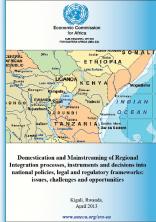Domestication and Mainstreaming of Regional Integration Processes Instruments and Decisions into National Policies, Legal and Regulatory Frameworks

Regional integration is considered to be one of the key drivers of Africa’s economic growth, development and poverty reduction and as such the African Union (AU) has accorded high priority to regional integration. In this regard, the AU has designated eight Regional Economic Communities (RECs), including the East African Community, Common Market for Eastern and Southern Africa, and the Inter-Governmental Authority on Development, as the building blocks for the realization of the African Economic Community envisaged in the Abuja Treaty. In support of the AU vision on regional integration, the United Nations Economic Commission for Africa (UNECA) is keen on domestication and mainstreaming of regional integration processes, instruments and decisions into national policies, legal and regulatory frameworks. In this regard UNECA Sub-Regional Offices for Eastern Africa and Southern Africa (SRO-EA and SRO-SA respectively), have established a Sub-Regional Coordination Mechanism (SRCM) for the United Nations (UN) System-wide Support to the African Union (AU), its New Partnership for Africa’s Development (NEPAD) Programme and Regional Economic Communities (RECs) in Eastern and Southern Africa.
SRO-EA, in particular, would like to use case studies of two or more countries to develop and disseminate a tool-kit on mainstreaming regional integration into national development strategies and implementation plans with a view to fast-tracking integration in the Eastern Africa region. Pursuant to this objective, SRO-EA initiated within the delivering as One-UN, a project on “mainstreaming regional integration in Rwanda.” This project aimed to support the Government of Rwanda through policy analysis and advice, thus enhancing the regional integration institutional framework. Hence, in addition to the work being undertaken in Rwanda, SRO-EA commissioned a study on Uganda with the objective of undertaking an analysis of the state of play toward mainstreaming regional integration in Uganda and preparing a policy-oriented report on mainstreaming regional integration focusing on the Ugandan experience. This report is essentially on the Ugandan case study, but makes cross reference with the Rwanda case to identify commonalities of the two processes.